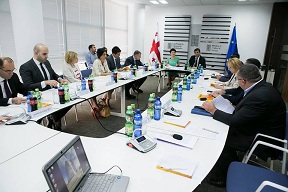Lana Giorgidze
Inter-Agency Task Force for Fair and Free Elections was established based on the June 29 decree of the Minister of Justice. The purpose of the IATF is to prevent and react to possible violation of electoral legislation by public servants during 2016 Parliament elections that will contribute ensuring of free and fair electoral environment.
The Inter-Agency Task Force organized meetings regularly once in two weeks; since the beginning of September, the commission members (deputy ministers of interior, foreign affairs, finances, defense, regional development and infrastructure, penitentiary, education and science; labor, healthcare and social welfare, deputy chief prosecutor and deputy head of the State Security Service, head of the department for the relations with regional and local self-governments at the Government’s Administration), representatives of the qualified election subjects, other political parties and election blocks, representatives of the local and international observation organizations participated in the sessions.
In accordance to the interim report of the Inter-Agency Task-Force for Free and Fair Elections, based on the June 29, 2016 Decree of the Minister of Justice the commission was established of 13 members (representatives of the state institutions). In order to effectively respond to the violations observed during pre-election period, the IATF decided to invite two more institutions in the commission – head of the supervision service at the Tbilisi City Hall and representative of the State Audit Service. At the same time, unlike previous elections, the position of the commission deputy chairperson was also determined under the law and deputy minister of interior occupied it for more effective work of the commission.
Nongovernmental organization Human Rights Center positively evaluates the fact that political parties and observation organizations had real opportunities to raise the election-related significant issues before the commission and provide the commission members with the information about alleged violations of the election code.
“The meetings of the commission were conducted mostly in constructive manner, but with the approaching Election Day, the representatives of the political parties tried to turn discussions into political debates. It could result into counter-demonstrations and provocations. In order to prevent that, the Commission issued the recommendations and appealed the political parties to explicitly warn their activists to stay away from meetings of the single mandate candidates from the opposition parties and avoid counter-propaganda, comments or public speeches, in order to prevent even verbal confrontations between the supporters of different political parties and to give opportunity to the candidates to communicate with voters without obstacles,” the report of Human Rights Center – Monitoring of 2016 Parliamentary Elections reads.
In accordance to the same report of Human Rights Center, despite the positive evaluation of the IATF’s work and practical recommendations, numerous violations were observed after the recommendations were issued. The IATF stopped working after the CEC officially declared the final results.
Georgian Young Lawyers’ Association petitioned to the IATF 4 times during the 2016 Parliamentary Elections. Lawyer of the election project Rati Tinikashvili said their applications referred to 17 facts of possible criminal offence. “The IATF promptly responded to our applications though they just sent information about the mentioned facts to relevant institutions. The reason is that under its mandate the Commission can just issue recommendations about the observed facts of violation.”
Rati Tinikashvili told humanrights.ge that the IATF is very important institution. It is a platform where election subjects, representatives of the observation organizations and state institutions can identify the law violation facts and discuss them.
“All in all the IATF held 14 session and issued 4 recommendations. The recommendations mostly were addressed to the political parties, election subjects and local self-governments. However, another issue is how the addressees fulfilled the recommendations. This year, the IATF issued 20 recommendations to combat violence during election period but despite that many violent facts were observed both during pre-election period and on the polling days.
Our recommendation is to change the mandate of the IATF though it requires set of legislative changes too,” Rati Tinikashvili said.
Lawyer at the International Society for Fair Elections and Democracy Nino Rizhamadze also positively evaluates the work of the Inter-Agency Task Force. However, in her conversation with humanrights.ge she noted that regardless positive aspects, they detected miscarriages in the work of the IATF.
“The IATF was timely set up and continued working without obstacles that can be evaluated positively. In terms of shortcomings, it should be noted that the IATF did not issue new recommendations in the period of 2016 Parliamentary Elections and mostly repeated the old ones. The most important miscarriage about the IATF is that it does not have leverage to control the implementation of its recommendations. At the same time, very often the commission sessions were good space to conduct debates for the members of the political parties than space for in-depth discussions. Considering that we would like the IATF had more clear duties and responsibilities. At the same time, relevant amendments shall be done in the legislation based on which the Commission will be able to monitor implementation of its recommendations by respective institutions,” Nino Rizhamadze of the ISFED said.
News
December 13, 2023
Ethnic minorities outside the peace dialogue
November 6, 2023
‘Peace’ agenda of political parties
Popular
Articles
February 13, 2024




